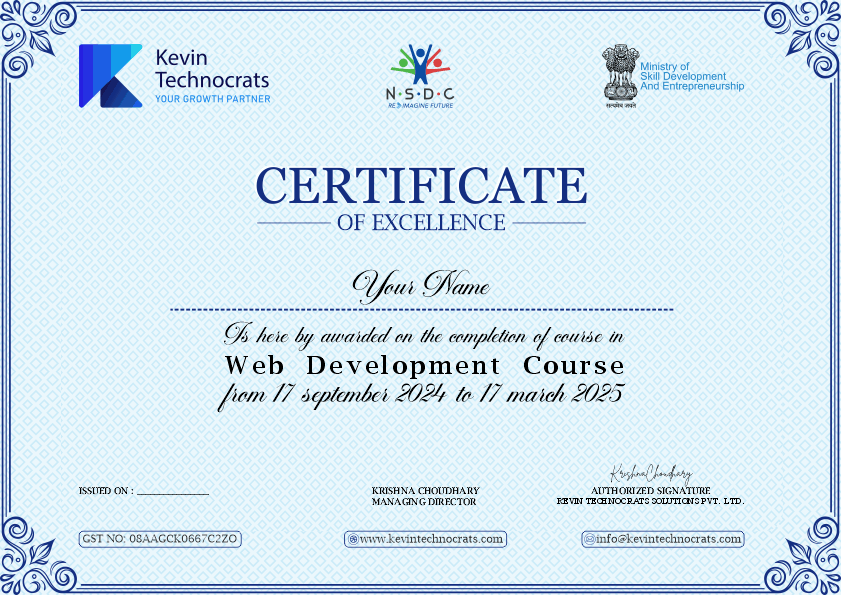

At Kevin Technocrats, we offer a dynamic Web Development Course in Jaipur that equips students with the skills to build robust, scalable, and interactive websites and web applications. Our course covers a broad spectrum of technologies, including HTML, CSS, JavaScript, PHP, and popular frameworks like React, Node.js, and Laravel. From front-end to back-end development, we provide in-depth training in both client-side and server-side programming, ensuring that our students are well-prepared for the full-stack development process.
In addition to core web development skills, the course focuses on database management with MySQL and MongoDB, version control with Git, and deployment techniques to make websites live. We also emphasize industry best practices, coding standards, and security measures, ensuring that learners are equipped to build high-performance, secure, and user-friendly web applications.
Our hands-on approach, coupled with live project work, ensures that students not only understand theory but also gain practical experience. With flexible learning options, including weekend and online batches, you can learn at your own pace. Enroll today at Kevin Technocrats and step into the world of web development with the skills to create cutting-edge websites and applications.
Learn the essentials of building dynamic websites with HTML, CSS, JavaScript, and more. Gain hands-on experience through real-world projects, preparing you for a successful career in web development.

Get a certificate of completion after successfully completing the course.
Master HTML, CSS, JavaScript, along with backend tools like Node.js and databases.
Work on live projects to develop websites, web apps, and portfolios.
Learn how websites run on the internet — including servers, domains, and hosting.
Make mobile-friendly, fast-loading, and interactive websites.
Gain skills for roles like frontend, backend, or full stack developer.
No experience needed. We cover the basics and go all the way to advanced concepts.
Front-End development focuses on the client-side of a website—the parts users see and interact with. It involves languages like HTML, CSS, and JavaScript. Back-End development deals with the server-side, where data is processed, stored, and served to the user. It involves programming languages like Python, Java, PHP, and working with databases like MySQL or MongoDB. Full-Stack development includes both front-end and back-end work, enabling a developer to create complete applications from start to finish.
No, you don't need to learn every programming language. Start by mastering the basics—HTML, CSS, and JavaScript for front-end development. For back-end, pick a popular language (Node.js, Python, or Ruby) and focus on that. Once you’ve gained experience, you can explore other technologies or languages as needed. Focus on mastering a stack (e.g., MERN, LAMP) rather than trying to learn everything at once.
The time it takes to learn web development depends on your dedication and how much time you can commit each week. For a complete beginner, it can take around 6 months to 1 year to become proficient enough to build functional websites and applications. A full-stack developer might take longer to master both front-end and back-end skills. Consistent practice and working on projects is key to speeding up the learning process.
Essential tools for web development include: Code Editors: Visual Studio Code, Sublime Text Version Control: Git (with GitHub for collaboration) Front-End Frameworks: React, Vue, or Angular Back-End Frameworks: Express.js (for Node.js), Django (for Python), Ruby on Rails Databases: MongoDB, MySQL, PostgreSQL Deployment Platforms: Heroku, AWS, Netlify, Vercel Testing Tools: Jest, Mocha, Cypress
No, a degree is not required to become a web developer. Many web developers are self-taught or have attended coding bootcamps. What matters most is your skillset, portfolio, and ability to build real projects. Employers often prioritize experience and practical knowledge over formal education. By building a strong portfolio and gaining hands-on experience, you can secure a job in web development without a degree.
